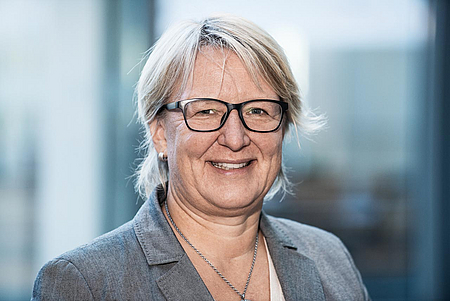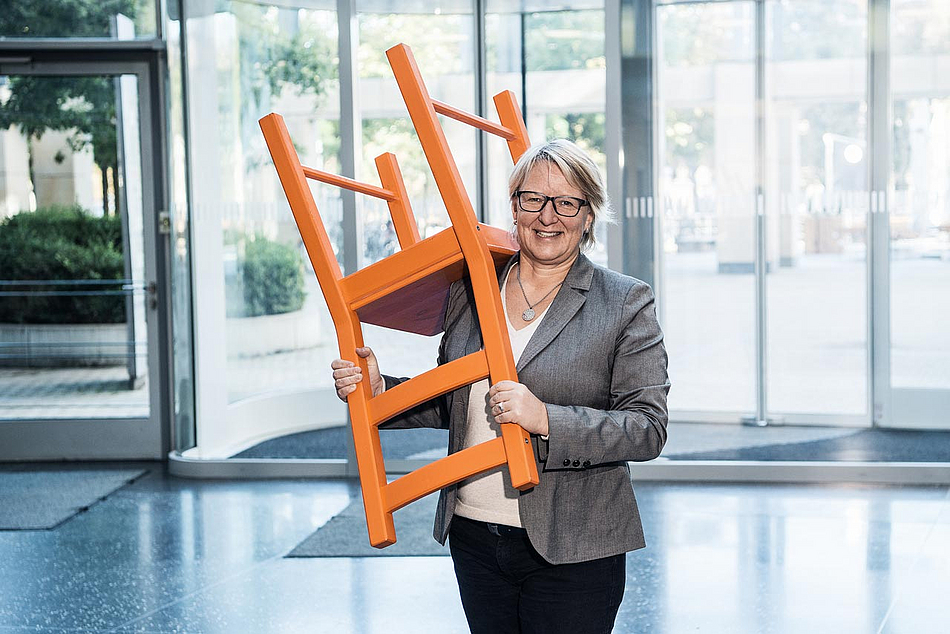A digital Rhinelander in Berlin’s IT scene
Sylvia Thun is an expert in information and communication technologies in the healthcare system and, as a BIH Visiting Professor, is building up an eHealth and Interoperability Core Unit. To do this, she regularly commutes between the Rhineland and Berlin. We took the opportunity to have an analogue, as well as digital, exchange with her about the development of eHealth in Germany and about her experiences as a cheerful Rhinelander in the capital.
Professor Thun, honestly now: even as a “digital brain”, are there any areas of your life that you’d rather lead analogously?
Yes: I’m particularly thinking of my sport – karate, in which it’s healthier to carry no wearables, i.e. portable computer systems, as they could injure your opponent.
In your opinion, where should clear boundaries be drawn for the electronic processing, use and exchange of data?
As soon as a person does not wish to release their data, that request should be honored. The vendor’s general terms of business should therefore be easily comprehensible and our laws should stipulate heavy punishments for “data robbers”. That is not a trivial offence!
In your view, which development in the field of eHealth has particularly good prospects of success at the moment? And what‘s the biggest challenge at present?
The regulatory requirements from Europe and the German authorities, such as the infection prevention reporting system of the Robert Koch Institute or the event notification for medical products at the German Institute of Medical Documentation and Information are our biggest political challenges. What is at stake here is the safety of people in our country and worldwide. To that end, we’ve specified worldwide standards that are currently being implemented. Oncology therapy which uses new methods based on molecular biology and pathology, and which – together with the patient’s data – can lead to the right therapy decision, is a large and important field for future developments.
What would the barrier-free exchange of medical data in everyday clinical practice in an ideal world be like?
When the data was entered, it would already be subject to standards that the doctor or documentation officer would actually not feel at all. This data would then flow into other systems and be available to all treating physicians. The patient would have access to the data collected about them as well and could, if they wanted to, make them available to science in an anonymized form.
In another interview, you said that patients have a right to IT standards. Who has to invest the most time and money in standardization and who can benefit from it?
Everyone benefits from IT standards: the IT industry has investment safety for its products and can reuse them;

Funding program
BIH Visiting Professors
Funding period
2018 – 2023
Research areas
Medical biometry, medical informatics
Project title
Establishment of an eHealth and Interoperability Core Unit
Institution
Berlin Institute of Health @ Charité (BIH)
Since 2011
Professor of Information and Communication Technology (ICT) in healthcare, Director of the Competence Center eHealth (CCeHealth), Hochschule Niederrhein, Krefeld, Germany
2004 – 2011
Research fellow, German Institute of Medical Documentation and Information, Cologne, Germany
2000 – 2004
Senior Consultant and branch manager at synaix-Healthcare; Beratung für das Gesundheitswesen GmbH, Aachen, Germany
the patient can transfer their data back and forth in different applications and make it available to the doctor, the caregiver, the therapist, the pharmacy or their relatives; scientists and the pharmaceutical industry gain data sets with medical findings, based on which they can offer better therapies and products.
What argument would you use to explain to people why IT standards concern everyone to some extent?
IT standards save lives and connect the world in a peaceful way.
Are there any parallels between your strategies in karate and in debates with critics of digitization?
I never attack others. However, with my 2nd DAN I’m definitely in a position to beat any populist arguments against meaningful digital applications with sound reasoning.
How many women are there in the field of IT today? Is there still a lot to improve or is the amount of women steadily increasing?
Let’s look at the podiums and senior management, as well as W3 professorships in the field of digital health: it seems that there are no women in those positions. So yes, there’s still a lot more to do. The initiative SHEHEALTH wants to help here.
Besides the questions about the contents of your project, let’s get to the organizational aspect. You regularly commute between the Rhineland and Berlin. In an interview with Tote Hosen singer Campino, Angela Merkel once complained that the “kebab culture in the Rhineland has hit bottom”. Conversely, is there anything that you feel is missing in Berlin?
Berlin and the Berliners are wonderful, and Berlin is refreshingly colorful. Actually, I only miss the carnival. What kind of answer do you expect from a Rhinelander who was born in Cologne?
Beyond the stereotypes, what is your experience of both regions? Are the Rhinelanders really more open than the people in Berlin?
Rhinelanders link arms and sway to music and sing more often and are very open in that way. I wouldn’t try doing that in Berlin. On the other hand, there’s a club scene in Berlin where people of any age can dance and feel good at any time of day. You can even sway to music there too!
January 2019 / MM
